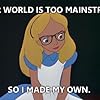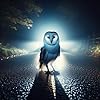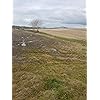Ellie
asked:
I don't feel the most comfortable asking this question but I'm asking because this is a topic I don't tend to read about much out of, again, discomfort. Not because I can't accept what my ancestors did, more because I'm worried about the chance I might disagree with some of it. My question is, does this book require you to agree with all of it's views to be enjoyable or is it a good discussion piece in it's own right?
To answer questions about
Why I'm No Longer Talking to White People About Race,
please sign up.
Lechelle Breeden
Discomfort is a sign of growth. Instead of being afraid of it embrace it and use it as an opportunity to learn about things that you wouldn't generally come across. It's ok to disagree but make sure you have an understanding as to why you disagree and are actively listening to the opposing side of the argument to understand it not to negate it.
Teresa
My input is that you should always seek to expand your thinking. You don't have to AGREE to learn and understand a different opinion. Also every book isn't intended to be enjoyable - and that is subjective - different people find different topics to be enjoyable. But a topic like this, I don't imagine many people find to be a FUN read. I would encourage you to at least give it a skim with an open mind to see the point of view that is being written. I personally :-) give you permission to not agree with all the views therein. ;-) . Also, I don't believe there is such a thing as a stupid question, however, I think that you question reveals your discomfort and perhaps some underlying fears (let me absolve you from what your ancestors did - don't feel guilty. YOU are only responsible for YOUR behavior - THAT is THE truth. You cannot be responsible for something done centuries before your birth - You can't be responsible for the behaviors that your parents may have done (if that's the case) - not slavery, but racism didn't end with slavery. Take a peek at the book. Give yourself permission to not HAVE to agree with everything and take a stand that you will at least enjoy seeing what this person's truth is.
I haven't read the book, but I am certainly curious to do so now and intend to. Follow up with me if you like and we can converse about it. I promise to not make you feel "some kind of way" ;-) I like Lechelle's answer to you, and looks like Angie has some good info on the topics - (I predict you will definitely find some of it uncomfortable, but that's ok - be willing to feel that and learn :-) - i hope this was a little bit helpful.
I haven't read the book, but I am certainly curious to do so now and intend to. Follow up with me if you like and we can converse about it. I promise to not make you feel "some kind of way" ;-) I like Lechelle's answer to you, and looks like Angie has some good info on the topics - (I predict you will definitely find some of it uncomfortable, but that's ok - be willing to feel that and learn :-) - i hope this was a little bit helpful.
Emilie
That is such a brave question to ask! I know it was two months ago but I am just very happy to see that some people are scared about those topics but still they shyly try to find a way towards it. I think asking the question is already wondering: " Oh I want to read this, but... sthg is trying to stop me". Congratulations for not letting that thing stop you and I hope you'll enjoy the book.
As to whether we agree with it or not, this is a non-fiction book, so she is not making up stories, she is summarising history. However ugly it is, it is just what it is, it is not for us to agree or disagree.
I think history is important, we need to understand it in order to come into terms with it and move forward.
As to whether we agree with it or not, this is a non-fiction book, so she is not making up stories, she is summarising history. However ugly it is, it is just what it is, it is not for us to agree or disagree.
I think history is important, we need to understand it in order to come into terms with it and move forward.
Readsdagoodstuff
stupid question. think about that question, apply it to any other book, then think about how you're probably the 'white people' this author is referring to. Sounds like you're making excuses to not read this lmao.
Angie
It's a good discussion piece and the essays could easily be used at jumping off points to start bigger conversations. It's broken up into different sections (white privilege, feminism, race and class, etc.) and I don't think you need to agree 100% with all the views expressed to gain something from it.
Ellie
I agree with most of the people who commented before me, so maybe this is nothing new. Be receptive to the experiences of others and I promise you will come out of it with a different perspective, different focuses, and a different way of thinking (if you're lucky!). Only you can decide how receptive to be, and remember that you can't exactly "disagree" with the experiences of others. Go in with an open mind and ready to receive what may make you feel uncomfortable and use what you learn to help you look at your own actions and your own socialization.
Dan222
Do you actually know who your ancestors were and if they did something? The vast majority of white people throughout history has been extremely poor and done absolutely nothing wrong. White people are now being shamed into hating our own ancestors who more than likely did nothing wrong. That is racism in its purest and ugliest form.
Gretchen Stokes
I find the author writes in a manner which discredits any other viewpoint besides exactly her own. With a couple of heaps of salt, or a good rewrite, this might the great discussion starting book you are looking for.
Leanne
I don't think that your question is stupid though I do think it's important for us to read outside of our comfort zone. I don't know if it's about an enjoyable read more about gaining further information.
Ella
I just finished reading this book for my bookclub and I must say, I didn't agree with 97% of it.
On some cases she made good points, but overall she seems to miss the point of most people who are critizing her for her views.
Lest said, it gives you a lot of fuel for discussion
On some cases she made good points, but overall she seems to miss the point of most people who are critizing her for her views.
Lest said, it gives you a lot of fuel for discussion
Megan
I think discomfort is ok, and so is disagreement! Reading is just supposed to expand your horizons and introduce you to knew people and ideas, but that doesn't mean you have to accept everything. It will mean expanding understanding, which is the only goal I have when I pick up something new :)
Deb cambria
It was recommended to me to read. It looks interesting but I'm frankly sick of everything we do or say being about race. I feel like it's something to be dealt with...in other words...we all have someone else's bias to deal with...I hope I learn something. I read about race all the time. I hope it's not a book full of anger and blame is all.
Mickey
I feel there is a lot of the book that requires you to agree with the views in the way that it's written, but at the same time, I (as an individual) can read books with an alternative view point to my own and still enjoy the read, much like reading a book on a serial killer, which obviously I would not agree with, but is read for entirely different reasons. Extreme example I know, but for white people to read this, I do feel there is some bias and hypocrisy, but it should not deflect some of the more potent and valid points made in the book
Maelanie
There is ‘what is,’ and then there is what we envision “should be.” This duality is at the core of most of our sorrows. There are the inner conflicts: the image we have of ourselves, the image we want others to have of us, and then there is what actually is, who we really are; and too, there are outer conflicts in our impersonal, platonic or romantic relationships; and also what is known as “society,” and the global divisions of nations, creeds, political factions, wealthy poor, race, so on, so on.
That being said, there is no “accept” or not accept; there’s no “agree” or disagree to ‘what is’—truth just is.
The amazing thing is that these relationships are mirrors to see who we really are; and it is only fear of seeing who we are, and the failure to face and accept ‘what is’ that drives a lot of hatred. Divisiveness produces conflict, conflict leads to violence, and violence is war (be it between boss and laborer; spouses; parent and child; siblings; co-workers; neighbors; customer and cashier; wealthy and servants).
These are fears, and they are conditioned psychological reactions, they are immature and ultimately weak. And most of these fears are based on mere beliefs, myths, superstitions, traditions, opinions, or personal experiences; not necessarily facts in evidence.
Just because something makes us uncomfortable does not make it any less true.
What we need to look at, what we must find out is, why?; why does that truth make us want to runaway? Self-awareness is wisdom, and to “see the truth in the false is freedom,” it is intelligence.
Maybe change is not forthcoming, but nothing will change unless it is faced.
That being said, there is no “accept” or not accept; there’s no “agree” or disagree to ‘what is’—truth just is.
The amazing thing is that these relationships are mirrors to see who we really are; and it is only fear of seeing who we are, and the failure to face and accept ‘what is’ that drives a lot of hatred. Divisiveness produces conflict, conflict leads to violence, and violence is war (be it between boss and laborer; spouses; parent and child; siblings; co-workers; neighbors; customer and cashier; wealthy and servants).
These are fears, and they are conditioned psychological reactions, they are immature and ultimately weak. And most of these fears are based on mere beliefs, myths, superstitions, traditions, opinions, or personal experiences; not necessarily facts in evidence.
Just because something makes us uncomfortable does not make it any less true.
What we need to look at, what we must find out is, why?; why does that truth make us want to runaway? Self-awareness is wisdom, and to “see the truth in the false is freedom,” it is intelligence.
Maybe change is not forthcoming, but nothing will change unless it is faced.
Cecilie Jøhnk
Like others said, you can learn from a book even if the author, say, jumps to conclusions you find unjust. Personally I just read a feminist, and even though I am a such one myself, I felt the author was jumping to conclusions on "How men was thinking". The book would have been better by just keeping to what those men had said through time about women.
ANyways, I think it will be good for us uncomfortable-feeling whites to read what the author does not have any more energy to discuss with us, and why.
If you need to warm up, I suggest reading Amber Ruffin's "You won't believe what happened to Lacey" (or something like that) which will leave you laughing, crying, and angry. It is a good introduction to why some black people are really tired of discussing racism, and it's not hostile, but might brace you for the next time someone is suddenly hostile, and you don't get why. You don't necessarily have to feel it's your fault, but it will be obvious why someone is angry, and why they are owed justice.
ANyways, I think it will be good for us uncomfortable-feeling whites to read what the author does not have any more energy to discuss with us, and why.
If you need to warm up, I suggest reading Amber Ruffin's "You won't believe what happened to Lacey" (or something like that) which will leave you laughing, crying, and angry. It is a good introduction to why some black people are really tired of discussing racism, and it's not hostile, but might brace you for the next time someone is suddenly hostile, and you don't get why. You don't necessarily have to feel it's your fault, but it will be obvious why someone is angry, and why they are owed justice.
Julian Morris
One star does come with the proviso "I did not like it". Very rarely I feel revulsion to a book but narrow minded racist books can do that to me sometimes even if they are in response to narrow minded racism. Based on your comment I have increased to two stars. Cannot give 1.5 stars. "It was ok but I did not like it."
Don Dealga
I suppose you read certain types of books for 'comfort', easy reading, relaxation etc....Other works stimulate, educate and challenge you even to the extent of making you 'squirm'! Maybe your (very commonly held) reluctance to read about 'this topic' is indicative of a deeper issue of the tendency of many to avoid exploring the roots and extent of racism, or to be unwilling to examine it because it is deeply unsettling and forces people to consider the origins and continuing hegemony of the privilege they enjoy.
Ellie
(by "it" I mean the book btw)
About Goodreads Q&A
Ask and answer questions about books!
You can pose questions to the Goodreads community with Reader Q&A, or ask your favorite author a question with Ask the Author.
See Featured Authors Answering Questions
Learn more




















Sep 21, 2018 05:33AM · flag
Jun 16, 2020 08:34AM · flag